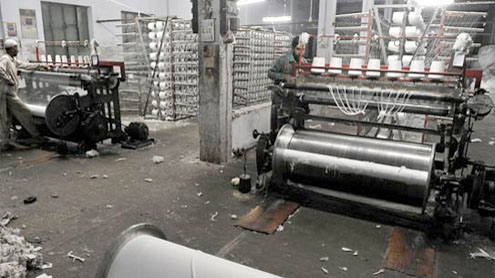
ISLAMABAD: The Ministry of Textile Industry has finalised recommendations for saving the textile sector from the negative impact of power and gas load shedding, seeking complete exemption from load shedding, freezing power tariff for at least six months and changes in rates of duties.
According to a brief of the Ministry of Textile Industry presented in the National Assembly’s (NA) Committee on Textile Industry’s meeting, the above agenda items relate to energy crisis for which briefing will be made by the respective departments. There is no agenda item relating to this ministry in this meeting. However, in the last meeting of the NA Standing Committee on Textile Industry held on May 23, 2012, inter-alia the following two decisions related to the ministry were taken, the committee unanimously recommended that a comprehensive report be submitted in the next meeting on the suggestions and proposals of the representatives of association on the crises of power.
The chairman had directed the ministry to send copies of suggestions incorporated in the budget proposals and arrange a meeting with the concerned ministry on implementation of Textiles Policy 2009-14.The textile industry is the base line of the national economy and textile exporters are the biggest stakeholders in foreign exchange earnings for the country and in keeping the industrial wheel running, generating employment and promoting exports.
To bring the textile industry back on track, the textile associations have made the following recommendations; industrial units should be exempted from electricity load shedding. Fuel adjustment surcharge should be abolished. Uniform rate of equal surcharge (2.0 percent) should be charged across-the-board. Maximum demand indicator (MDI) surcharge should be abolished during load shedding hours. Electricity tariff should be frozen for six months.The Ministry of Textile Industry has also circulated gas summary for the Economic Coordination Committee (ECC) of the Cabinet to ministries and divisions for their views and comments. As soon as comments of Ministry of Petroleum and Natural Resources are received, the summary will be submitted to the ECC of the Cabinet.
The ministry had asked different textile associations to submit their proposals for inclusion in the budget 2012-13. As a result of the same, a number of proposals were received from them. This ministry had requested the Federal Board of Revenue (FBR) to consider the following proposals in the budget 2012-13. Shifting of section mentioning item one (polyester chips HS code 3907.6010) if Column 2 of Schedule XII from SRO 212 (l)/2009 to SRO No 209(l)/2009 as it belongs to textiles value chain. Revision of duty drawback of textiles value chain. Addition of text ‘filament’ after the word fibre in item number one of Column 2 of Schedule Vl of SR0 209(l)/2009.
Addition of code 5402.4700 in item number one of Column 3 of Schedule V1 of SO 209(l)/2009. Replacement of text ‘repayment of customs duties to the extent specified in Column 5 of the schedules below, paid on the importation of new materials’ with ‘payment of drawback to the extent specified in Column 5 of the schedule below on the raw materials’ in the Para 1 of SRO 212(1)/2009. Change in PCT and customs duty, this ministry has requested the FBR to intimate as to which of the proposals have been incorporated in the budget 2012-13. Response from FBR is still awaited. However, it is encouraging that the Finance Division has allocated Rs 10 billion for Export Investment Support Fund in the budget 2012-13. As per previous practice, this ministry would be getting Rs 7.5 billion or less. – Dailytimes












